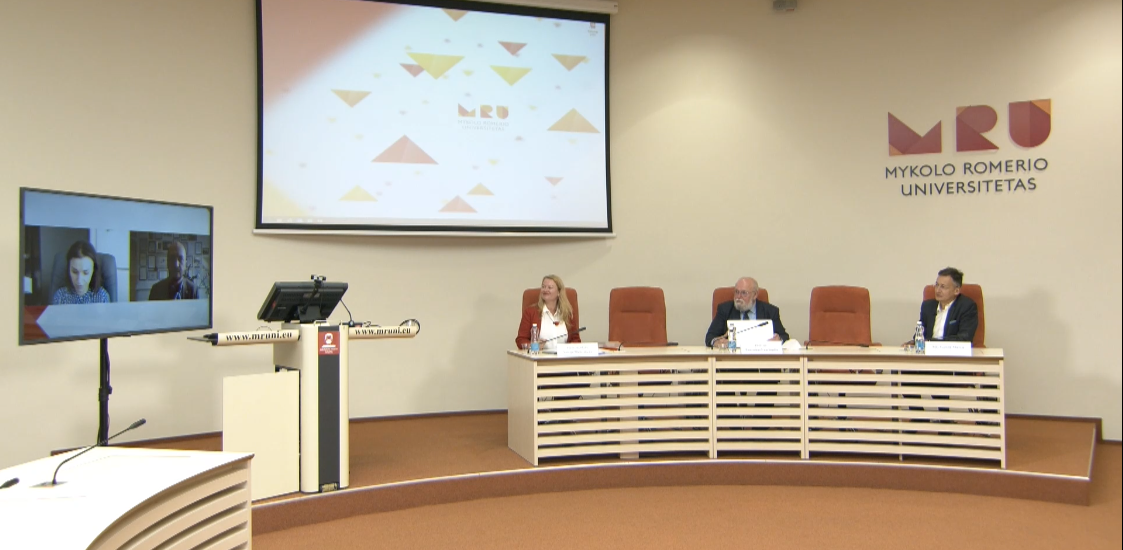


The event was held in a high quality hybrid format: appr. 50 “live” guests joined the conference premises and technician team streamlined the event both ways for about 250 participants from Lithuania, Czech Republic, Norway, Ukraine, Poland, Albania, Luxembourg and other countries who joined the presentations and discussions online.
We asked the Project Manager dr. Salvija Mulevičienė, Head of the Justice Research Laboratory at the Mykolas Romeris University (Lithuania), to share her thoughts on how this project relates to strengthening the Rule of Law in Europe and what kind of results the experts already discussed at the conference.
Could you in few words explain the idea of the project „Portrait of a Judge”?
Salvija Muleviciene. We live in the age of transparency. Our societies require from decision makers to base their decisions on the major public issues on quality information, without prejudices, conscious or unconscious biases or undue influence. One of such sensitive and highly relevant issue is: who and most importantly, how, became judges and presidents of courts.
The research shows that currently many European countries share the opinion that there is lack of transparency in procedures aimed to ensure that only those who due to their personal qualities and professional competences are able to achieve judicial excellence became judges and get promoted to the highest judicial offices. Also the glass ceiling is still a reality and the percentage of women clearly decreases as one moves up through the judicial hierarchy.
Our project addresses this common European challenge in the justice area directly and aims to create an innovative, transparent, scientifically based, unbiased model of competencies and methods which can be effectively applied by different countries to the selection, appointment, and evaluation procedures of judges.
The first international conference focused on the comparative views and discussing first results. Was it met with interest by the members of the judiciary?
Salvija Muleviciene. The exclusivity of this project is the close cooperation between academia and judiciary. I would like to stress that when opening the conference Mr. Gian-Luca Bombarda, Fund Director of the Fund Operator for the EEA and Norway Grants Fund for Regional Cooperation pointed out that the Fund’s bar for the results is set very high.
Same high expectations are raising our partners from the judiciary. I personally find this very motivating. The project is lead by the scientists but the judiciary shows their clear interest to have the transparent and unbiased system of the selection, evaluation and promotion of judges. It came therefore as no surprise that the high level representatives of courts systems in various countries willingly participated at the conference with the welcome words, presentations and discussions. For everyone interested to hear what does it take to create and participate at the demanding procedures of becoming a judge I suggest to listen to the interesting insights of Justice Sigita Rudenaite, Chairperson of Council of Judges of Lithuania, Ms Naureda Llagami, Chairperson of the High Judicial Council of Albania or dr. Luboš Doerfl, President of the High Court of Prague.
Great that you mentioned, the conference was streamlined online in English for 2 days and can still be viewed by interested society. What parts of it would you suggest to watch for a non-lawyer?
Salvija Muleviciene. When we are talking about transparency and that decisions on who should became a judge or a court president need to based on the quality information the difficulty is that we are not measuring objects. Our focus is on the Human Being. So how do we measure the personal qualities of humans? How do we measure the integrity of a judges personality? What kind of information do we need to collect in order to make transparent decisions based on merits and not on political agenda or personal subjective and maybe biased opinions?
These were the hard questions asked during the conference. And I would suggest for anyone to check the presentation of Prof. dr. Eugenijus Laurinaitis, psychiatrist, professor of Mykolas Romeris University, former chairperson of the Commission of the Candidates to Judicial Office of Lithuania discussing if it is possible to develop a universal methodology that would accurately and objectively assess the psychological readiness of individuals for the work of a judge. And I must say, I moderated the discussion “How to measure personality” between the prof. Laurinaitis, Mr. Georg Stawa, Judicial attaché, Ministry of Justice of Austria, former President of the CEPEJ, Mr. Sergejus Muravjovas, Head of the Transparency international Lithuanian office and Ms Kateryna Sikora, Judge of the High Anti-Corruption court of Ukraine not only with the scientific interest but also with great pleasure.
We know that many countries are initiating the national reforms in the area of selecting, evaluating and promoting of judges. Can the project “Portrait of judges” provide guidelines for them?
Salvija Muleviciene. This is one of our main aims: to give input for policy development in the area of judge’s selection, evaluation and promotion in the whole Europe and beyond. We are not focusing on one specific country. We are constructing the flexible model, a kind of the common reference framework which could serve as quality standards for the systems of the judge’s selection, evaluation and promotion procedures and will strengthen the capacity of each interested country to identify the strengths and weaknesses of their judicial systems approach to the mentioned procedures and also measure the results of the judicial reforms.
We believe that this science-based model will promote higher public confidence in the judiciary, counter perceptions of undue influence and corruption and in doing so strengthen the Rule of law.
And the practical question: where can we find the online video records of the conference?
Salvija Muleviciene. For your convenience you can find separate video files with presentations and other information about the project at our website https://judgeportrait.eu or at YouTube channel:
DAY I: https://www.youtube.com/watch?v=7ey1FsmUay8
DAY II: https://www.youtube.com/watch?v=-54LuTkPtgY
Thank you very much for your insights.